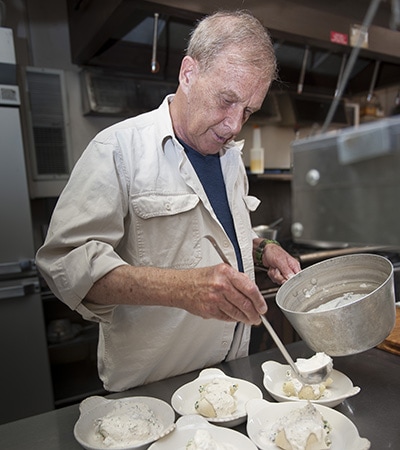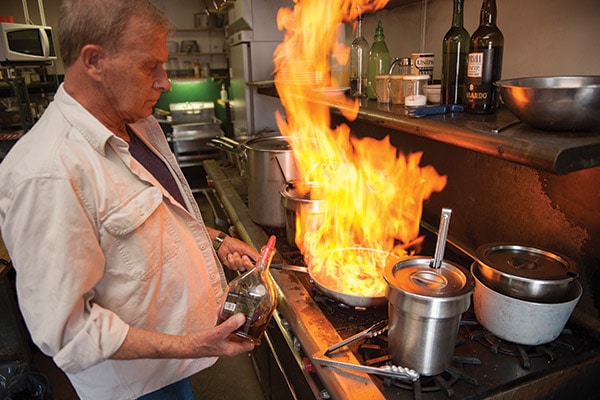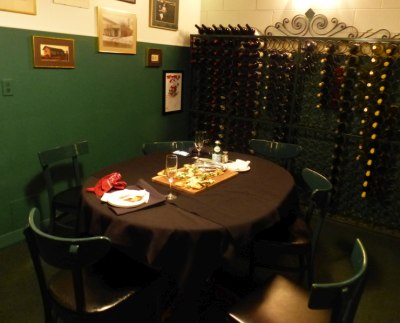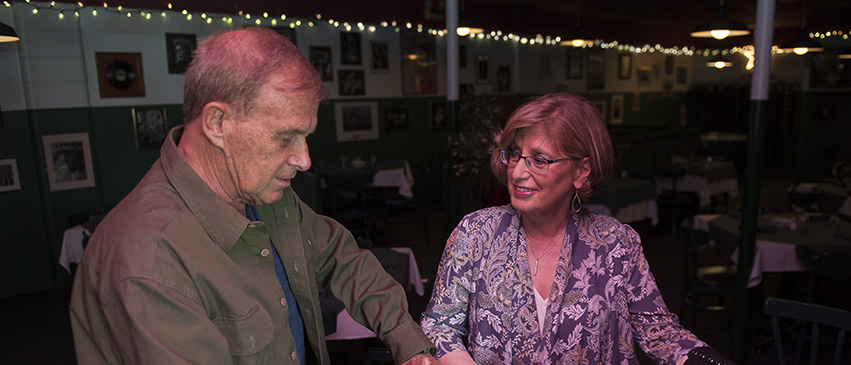Bruce Brown and Lisa Mancuso, partners in business and life, sit at the vaunted back corner table at Paparazzi and speak of “attorney-client, doctor-patient privilege.” In short, what gets discussed at the Peoria Heights restaurant, usually after hours, remains confidential. Just don’t be surprised if what is learned there, not uncommonly over a bottle of Grand Marnier, ends up an action item on their shared civic agenda.
“This place has a power of its own,” Bruce claims, citing example after example of causes being championed there—of arms being twisted, of talented people being talked into running for public office, of influential strangers being introduced, of checks being passed to put one more community project over the top. “You’re here in that comfort zone, not a meeting in somebody’s boardroom,” he adds.
Countless area restaurants cater to every conceivable taste, but “Italian’s different,” Brown says. “There are three operative words: ‘Familia, familia, familia.’ This is not about making money. It’s about… coming to be with your family, where everybody in the dining room is part of the same family.
“After so many years, you get a bad medical report and you come here. You get a good medical report and you come here. You get engaged and you come here. You get divorced and you both come here…” he trails off. If only the black-and-white photos adorning the red, white and green walls in this never-changing place could speak.
Back In The Saddle
It is early June 2020, and Bruce and Lisa are talking about Paparazzi’s 37th anniversary on July 5, which will coincide with their reopening after going dark for 14 weeks. It’s “the one that almost didn’t happen,” Bruce says.
Indeed, Bruce is 72, Lisa 65, and four decades is a long time to do anything. Did they think about hanging it up? “Actually, it’s probably just the opposite,” Lisa suggests. They missed the work, but they missed their customers most of all—the regulars with their usual orders, some even offering to drive up to their homestead in Marshall County if Bruce would kindly fix up a batch.
It’s not that calling it a career wasn’t tempting. “We got to experience involuntarily what retirement is really like,” Bruce notes. “It’s pretty good.”
“Except for the paying-the-bills part,” adds Lisa, the yin to his yang, the one who handles the business side while he commands the kitchen (though she makes the soups, salads and a mean gelato).
Ultimately, the former Marine in Brown never strays too far. “There’s not a circumstance where I would let this place close where people thought the pandemic did us in,” he says. “Not going to happen. We owe it to our customers. We owe it to our crew here.” And to think: Paparazzi might never have opened at all if those fickle voters hadn’t changed their minds.
 Turning Points
Turning Points
It’s 1981, and Brown—one of the youngest City Council members in Peoria’s history—thinks he wants to be mayor. It looks within his grasp after winning the primary. Did he believe he would upset incumbent Dick Carver? And in retrospect, did things turn out the way they were supposed to when he didn’t? “Absolutely, yes,” on both counts. Still, his loss was a disappointment, and it caused a self-reexamination.
Every life has its turning points. For Brown, the first came when he was drafted as a Bradley University senior during the Vietnam War. The second came in that pivotal year of 1981, when he was “feeling pretty sorry for myself, divorced, no job, behind in house payments,” and defeated at the polls. Then Lisa Mancuso walked in. “At that moment, my life began changing for the better.”
A third turning point came two years later, when older brother Peter talked them into opening an Italian restaurant in an odd, if inexpensive, location. Bruce wasn’t a cook. Lisa was a server and actress at Conklin Dinner Theatre. There was no business plan, aside from “a couple of paragraphs about what we were going to do the next day.” The Pabst plant had closed, and Peoria Heights was far from booming.
“I’ll show you what to do,” Peter said. Meanwhile, Bruce’s very Italian mother, Clarina, lived just blocks away, her dust rag and special spoon always at the ready. Paparazzi still features her pasta fagioli and gnocchi, and Bruce still uses that well-worn spoon. “It really does stir better,” he declares. “I wish my mom and brother could see us now.”
Formula of a Fanatic
Well before Peoria Heights bragged of its Restaurant Row, before it became a regional culinary destination, there was Paparazzi, which central Illinoisans somehow found even before GPS. “What makes it work is exactly what shouldn’t make it work: It’s an out-of-the-way place,” says Brown. That meant “it had to be different, in ways you see and in ways you don’t see,” from the quality of the tomato sauce to the price of the wine.
First, the food had to be superior. From chicken in parchment to the veal piccata, the last 37 years would seem to testify that a lot of folks think it is.
Second was the attention to detail. “If somebody brings out a salad and the plate’s not cold, somebody doesn’t know what they’re doing. If it’s a hot sandwich and the plate isn’t hot, somebody doesn’t know what they’re doing.” If diners order the same entrée, the portions better be the same size. “These little nuances in and of themselves are nothing, but they contribute to the whole experience.”
Third, “What’s the most valuable asset in the building?” Bruce continues. “The kitchen? No. It’s the people who work here.” One server, for example, has been with the restaurant more than 30 years. The dishwasher? Nine years. That’s rare.
Fourth, “part of the formula here is the interaction between the tables.” Otherwise, “why not put people in a plastic suit and feed them through a tube?” he chuckles.
Finally, don’t underestimate the appeal of the intentional, cozy familiarity and predictability—the timelessness of a place that, except for a few touches here and there, looks and feels much as it did 37 years ago. “If it’s always good all the time, somewhere in the building there’s a fanatic,” says Brown, who accepts that as a compliment. “Everyone here knows that just anything will not do… It’s about hitting the ball out of the park.” Alas, there’s something else.

Community Building
If a conversation with Bruce Brown can be likened to sailing down a long river… you must travel many a tributary before returning to the main channel. And Lisa is usually the one paddling him back in that direction. “Here’s the other side of the story you can’t tell,” he’ll often say, and off you go.
Perhaps it’s an outgrowth of his political career. Maybe it’s the advice his apolitical mother gave him about public life—that “this is not about what you’re going to get; it’s about sharing what you’ve been given.” Whatever, at some point they decided to “use our leverage here to create something where one plus one equals three,” Bruce explains. “Let’s call it community building.”
Peoria Ballet. Toys for Tots. Easterseals. Salvation Army. Central Illinois Landmarks Foundation. Peoria Historical Society. Springdale Cemetery. Honor Flight. Rock Island Trail. Sculpture Park… Paparazzi has hosted dozens of charitable events and fundraisers over the years.
Bruce and Lisa are unapologetic Peoria boosters—he sometimes to the point of ruffling feathers. He’ll note that he’s “had words” with someone who may not have been on the same page. “You have words with a lot of people, dear,” Lisa says.
Magic Around the Table
Maybe it’s that back table or the dimly lit, noir-like atmosphere. Maybe it’s the Grand Marnier. Whatever it is, magic happens there.
“It has a charm,” says Wayne Baum, chairman of CORE Construction and a regular, like 90 percent of the clientele who appreciate Paparazzi’s neighborhood hangout feel—many having seen their youth slip into middle and even old age while breaking bread there. “It’s a place where deals are made. A tremendous number of projects were born there… really positive things for the community.”

It’s where Brown asked Heights Mayor Mike Phelan to run for the job, the latter recalls. “What I love about Paparazzi is Bruce coming out to the table after dinner… I’ve literally sat there for two or three hours with him, talking about everything from politics to art to trails. The conversation is second to none.”
Moreover, these two “pioneers”—Lisa and Bruce, Bruce and Lisa—have “always been generous with their time and money,” Phelan adds. “Their following is among the most loyal I’ve seen.”
Why? “It’s friendship and it’s a trust that people can share ideas and even critique each other in a positive way, knowing that everyone around the table has the common good in mind,” Phelan suggests. “A lot of people have good ideas but can’t accomplish what they set out to do. Bruce and Lisa have gotten a lot done… big things.”
Ultimately, “you feel like family there.” And there’s that word again. Familia, familia, familia.
The Final Frontier
Nearly 40 years and a game-changing pandemic can lead to a little rumination. “Why are some lucky and some are not? Why do some go into a business with a 98-percent failure rate and it turns out?” Bruce muses. “They say space is the final frontier. It’s not. It’s time.”
There’s an old saying in the hospitality business that “there are only two times a restaurant is sold,” he continues. “One is when they want to; the other is when they have to.” Paparazzi is in neither position.
“We’d like it to see 40. Maybe we will, maybe we won’t,” Bruce says. “But whatever it is, we want to maintain the unfathomable ambience here. I don’t know that it exists anyplace else.
“The place has its own power. It sure got a hold of us.” PM




